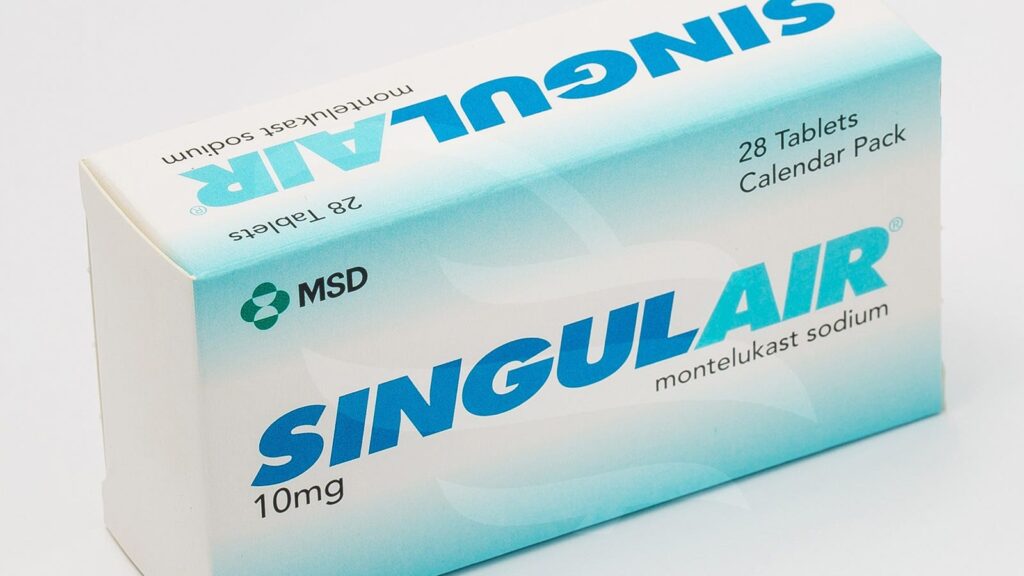Montelukast (Singulair) held no elevated risk of depression, anxiety, suicidality, or behavioral problems for children, according to a new study that throws further doubt on the black box warning over neuropsychiatric risk.
Among Swedish children ages 6-17 years, incidence of neuropsychiatric adverse events was 2.39 per 100 patient-years among montelukast users compared with 2.41 per 100 patient-years among users of another class of asthma and allergy drugs, long-acting beta-agonists (LABAs; weighted HR 0.99, 95% CI 0.84-1.16).
No significant risks were seen for specific neuropsychiatric events individually or in any subgroup or sensitivity analysis, Viktor Wintzell, PhD, of the Karolinska Institutet in Stockholm, and colleagues reported in JAMA Pediatrics.
“In aggregation with other robust observational studies, these results can inform the management of asthma and allergic rhinitis in this patient group,” the researchers wrote, and also inform regulatory agencies.
“Suspected neuropsychiatric adverse effects of montelukast have been a major concern for patients, clinicians, and regulators since the signal emerged from spontaneous report in 2008 and FDA announced a boxed warning in 2020 advising against the use in patients with mild disease,” they noted.
The boxed warning has applied to both pediatric and adult use, but there has been an emphasis on getting pediatric evidence, Wintzell’s group noted. The original analysis of the FDA’s Adverse Event Reporting System from 1998 (when the drug was first approved) to 2019 had identified 82 cases of completed suicide in patients using the drug. In 64 of these for which the patient’s age was known, 19 were in children and teens younger than 18.
The quality of the evidence for neuropsychiatric risk with montelukast has been questionable.
“Disproportionality analyses of spontaneous reports do not provide conclusive evidence on risk, owing to the lack of denominators, appropriate comparators, and bias adjustment,” Wintzell and colleagues pointed out.
One observational self-controlled study from Korea had found elevated risk in one age group, “but most methodologically sound studies have shown no association between montelukast and neuropsychiatric adverse events,” Wintzell’s group wrote. A recent cohort study of U.S. data from the Sentinel database including both children and adults found no association with hospitalization for depression or self-harm compared with users of inhaled corticosteroids. A manufacturer-led post hoc analysis of 35 and 11 placebo-controlled trials in adults and children, respectively, didn’t turn up any link to behavior-related adverse events compared with no montelukast use either.
To expand the pediatric evidence, the group analyzed a nationwide register-based cohort of children ages 6 to 17 years in Sweden from Jan. 1, 2007, to Nov. 30, 2021. Participants used either montelukast or a LABA, which was considered “a more suitable active comparator than ICS because, like montelukast, it is an add-on drug; a majority of patients have previously used ICS when initiating montelukast, and they are regarded as equivalent therapeutic alternatives in this age group, according to guidelines.”
Risk for specific neuropsychiatric adverse events between montelukast and the LABA group were similar across the board, with hazard ratios as follows:
- Anxiety: 0.79 (95% CI 0.54-1.14)
- Depression: 1.16 (95% CI 0.70-1.95)
- Sleep-related disorders: 0.93 (95% CI 0.76-1.13)
- Suicide and suicidal actions: 1.31 (95% CI 0.64-2.69)
- Disrupted control of activity, attention, and behavior: 1.27 (95% CI 0.84-1.90)
- Confusion and psychotic-like symptoms: 0.51 (95% CI 0.05-5.53)
Limitations of the study included use of diagnosis codes in specialist care and dispensings of prescription drugs as diagnosis proxies, which leaves open potential for misclassification, “in particular low sensitivity,” the researchers noted. “There is a risk of subclinical events, and there might be a lag between the onset of symptoms and when the patients seek healthcare.”
The study conservatively excluded patients with any psychiatric history during the previous 5 years to avoid analyzing prevalent patients.
“However, awareness of suspected adverse effects of montelukast, which gradually increased over the course of the study period, might induce outcome misclassification,” the group noted. “Increased monitoring of patients taking montelukast could bias the association away from the null, but awareness could also lead to channeling of patients deemed at higher risk to alternative treatments, inducing bias in the opposite direction. Because a null result was observed in the current study, this potential bias was not a serious concern and the subgroup analyses by date of drug initiation showed no temporal patterns in association.”
Disclosures
Wintzell was supported by Swedish Asthma and Allergy Association’s Research Fund, HKH Kronprinsessan Lovisa’s Fund, Karolinska Institutet Research Grants, the Konsul Th C Bergh’s Foundation, ìShizu Matsumuraîs Donation, and the Fredrik and Ingrid Thuring’s Foundation.
Co-authors disclosed relationships with Janssen Global Resources through the Janssen-Karolinska Institutet Real World Data Collaboration outside the submitted work and the Scientific Council for Medicinal Products for Human Use of the Swedish Medical Products Agency.
Primary Source
JAMA Pediatrics
Source Reference: Wintzell V, et al “Montelukast use and the risk of neuropsychiatric adverse events in children” JAMA Pediatr 2024; DOI: 10.1001/jamapediatrics.2024.5429.
Please enable JavaScript to view the comments powered by Disqus.
Source link : https://www.medpagetoday.com/pulmonology/asthma/113859
Author :
Publish date : 2025-01-21 16:07:17
Copyright for syndicated content belongs to the linked Source.
